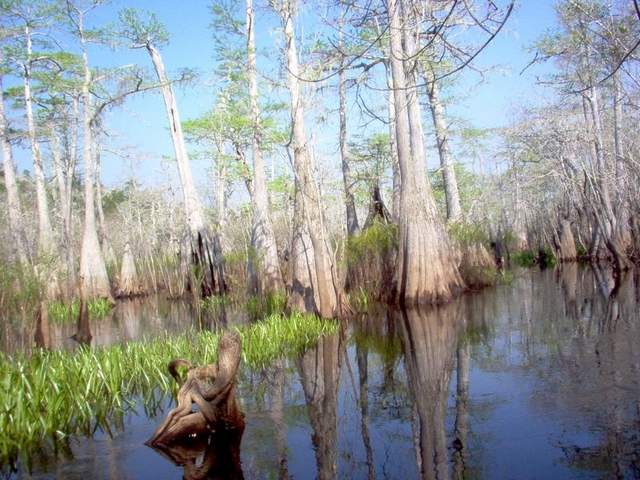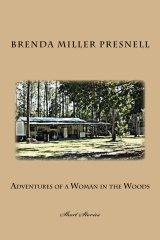Hunting News


April 19, 2014
Florida Fish & Wildlife News Release

February 12, 2014:
FWC modifies some hunting zones; adjusts turkey bag limit on private lands

Outdoor enthusiasts at odds with military over possible training in Tate's Hell

New River, pictured here, is one of three primary rivers in water-rich Tate's Hell State Forest. The Air Force is considering asking the Florida Forest Service to use the forest for non-hazardous military training. / Leslie Cox/Special to the Democrat
Tateâs Hell State Forest, best known for its swamp, seclusion and signature species, may become the site of weekly helicopter drops of up to 50 men, careening Humvees with blacked-out headlights and foraging soldiers made to subsist off the land for seven days.
Link to article.
Florida Alert: Leon County Commissioners Considering Gun Control!
As reported by the Tallahassee Democrat, uber-liberal Commissioner, Mary Ann Lindley, is leading the Leon County Commission in an effort to have Leon County Commissioners join liberal anti-gun south Florida counties in imposing gun control restrictions on their citizens.
More . . .
Stay safe, be responsible on public lands
FWC News Media Release, October 28, 2013
Florida Fish and Wildlife Conservation Commission
Across the nearly 6 million acres in Floridaâs wildlife management area (WMA) system, officers with the Florida Fish and Wildlife Conservation Commission (FWC) can be found atop buggies, operating all-terrain vehicles, in patrol trucks and on foot. One part of their job is to patrol public lands. . . .
DEADLINE FOR PUBLIC INPUT: September 12, 2013!

DEADLINE FOR PUBLIC INPUT: September 12, 2013!
Today I was made aware of the intent of the US Air Force to use Tateâs Hell State Forest for military training exercises. The deadline for public input to the US Air Force is September 12, 2013. I urge all my readers to contact the Air Force, Senator Bill Nelson, Senator Marco Rubio, and Congressman Steve Southerland and voice your concerns. Below is a copy of my letter. At the end of my letter I have placed important links for your information regarding this important proposal.
September 7, 2013
TO:
Mr. Michael Spaits, Gulf Regional Airspace Strategic Initiative
(GRASI), Eglin AFB
Senator Bill Nelson
Senator Marco Rubio
Congressman Steve Southerland
Dear Sirs:
RE: Opposition to the inclusion
of Tateâs Hell State Forest in the US Air Forceâs Gulf Regional Airspace Strategic
Initiative (GRASI) Landscape Initiative
I am writing to express my concerns and opposition to the use of Tateâs Hell State Forest for military training exercises. I was born and raised in the panhandle area of Florida. This is my home. I cherish its forests, wetlands, rivers, and wildlife. I feel that they should be protected for future generations to enjoy and cherish as well. I would like to bring to your attention a few of my concerns regarding this matter.
Deer population concerns:
The State of Florida has identified that the current deer population of
younger bucks is over harvested. Therefore,
for the 2014-2015 deer seasons in northwest Florida, they have proposed an
antler restriction to be implemented using Interstate 10 as a dividing
line. This means that the supposedly
over harvested younger-aged class of bucks in the Tateâs Hell State Forest and
the Apalachicola National Forest are to be further impacted due to the
increased military incursion into their habitat that will disrupt their lives
both day and night. Instead of allowing
the hunters more land to hunt on, reducing the impact on the deer herd in a
given area, this military training initiative is going to further concentrate
the deer herd into smaller areas both reducing the available food source and
creating an environment for disease.
Florida is one of the few states to thus far not have a documented case
of chronic wasting disease and has restricted the importation of deer from out
of state. One of the contributing
factors to this disease it has been said is crowding many deer together. This disease not only spreads from close
contact with infected deer but contaminates any area that a deer has eliminated
his bodily waste in where it will precipitate both in nearby vegetation and
water until another unaffected deer just happens to drink or feed. To make matters worse we have an increasing
problem with bears and coyotes preying on deer. If an animal feeds on an infected deer, that animal
now becomes a carrier and anywhere that animal eliminates his bodily wastes,
the nearby vegetation and water also becomes infected. Therefore, to further concentrate the deer
numbers into a smaller area just doesnât make sense.
Bear population concerns:
Floridaâs Bear Management Plan utilizes the Tateâs Hell State Forest to be set aside for the bears. If we lose even one acre to a military footprint in this area, where would the new bear habitat come from? If due to the military presence the bears are displaced from these training areas that would mean that nearby towns, such as Carrabelle and Eastpoint, will see an additional population increase to their bear problem not to mention the nearby residents that live on three sides around Tateâs Hell State Forest that already are burdened by the local bear population.
Limiting or prohibiting public access:
I know of seven State-designated camping areas along New River in Tateâs
Hell State Forest north of Gully
Branch Road that are utilized by hunters every hunting season. The reason I mention these seven campsite
areas in particular is that these seven campsites fall within one to three
miles of one of the proposed airstrips.
A lot of these campers hunt adjacent to these areas which would place
them right in the middle of any military training. There
is a concern whether the animals would remain in these areas due to the increased
burden, both night and day, of a military presence by both vehicles and air
traffic. So if this airstrip placed any
burden on the wildlife, it would have a direct impact on these camper hunters. With the already limited access to public hunting
lands due to many other state wildlife concerns, these people would no longer
be able to feed their families the wonderful bounty they are able to harvest on
our Florida public lands. The hunters
would have to go somewhere else to hunt and compete for space with the other hunters
that are using other areas of public land that may already be
overburdened.
Imagine this scenario: You
worked all week. Youâve planned and
prepared. You stayed up late Wednesday
and Thursday nights moving in your camper and setting up a pristine campsite in
anticipation of a beautiful family weekend adventure. After you get off work on Friday and get
everybody gathered up and drive to your campsite at the turnoff of the paved
road there is a roadblock and youâre informed that this area is closed to
public access for the next two weeks. So
you have to turn around and go home disappointed while your camper and other
possessions just sit there at the campsite.
Hopefully, your possessions are safe; but you never know. As previously mentioned, this area has been
designated by the State as a part of the bear management area. This is only one scenario; but Iâm sure you
can come up with more on your own.
Damage to the ecosystem:
Traffic from the supplies, equipment, and military personnel entering
and leaving the wildlife areas and the on-going training would greatly damage
the ecosystem. Since I am familiar with this area, I know that they will need
to build new roads to access the training areas. And since this area is very wet to start with,
the construction of an airstrip will require both removal and new fill of dirt
to be brought into the area to support the weight of an airstrip. This area supports plant life which is
protected, such as pitcher plants and orchards, some of which are found nowhere
else.
Everything that lives in the wildlife area is dependent on each other
for a healthy and balanced ecosystem.
When one element is damaged or destroyed it affects everything else down
the line. For example, if all the vegetation
is destroyed, then the animals that feed on it die. Then that causes the animals that would have fed
on those animals to die and then it goes on and on.
Decline of health and well being of population:
There are many people who gain great benefits, both spiritually and mentally, by their connection to the outdoors and wilderness areas. By limiting of the publicâs use of the State Forests it would contribute to the decline in the overall health of the general population.
Power line hazard:
The southern border of the Apalachicola National Forest is only one
mile north of the proposed most northern airstrip in the Tateâs Hell State
Forest. Running along this southern
border of the Apalachicola National Forest is a power line which will be in
close proximity to the airstrip and could create an aviation hazard or possibly
cause an accident with low-flying aircraft such as the proposed helicopters.
As a side note, some of the numbered roads in the Apalachicola National
Forest would not be there had it not been for military aircraft that had
crashed in the Apalachicola National Forest in the past. At the time of the accidents, this created a
great disruption to the serenity of the forest as well as ecological damage. However, we did receive a benefit of new
roads being built to the crash sites which increased our access to the
interiors of some of the large blocks of land.
Increased road maintenance costs
due to traffic:
The increase in heavy vehicle traffic, i.e. heavy trucks as well as the
number of vehicles, on the paved and unpaved roads that will be utilized by the
military vehicles will impact the condition of the road surfaces that the
counties and State are already challenged trying to maintain with their limited
budgets.
Noise:
The surrounding area, as well as Tateâs Hell State Forest, already fall
within a training zone that the military fighter planes use for dog fighting. I have had many an outing disrupted by
low-flying military aircraft some of which were so close to the ground that on
one occasion when a fighter made a tight turn over our heads we were able to
see him wave at us on the ground. Any
increase in this air traffic, day or night, would greatly diminish the
enjoyment of time spent in the outdoors on our public land.
Night training would also disturb people in the area who are trying to
sleep. This is not just hunters during
hunting season, but people that camp and fish throughout the year as well as those
living in nearby towns. They will not
only have to deal with the air traffic but also the vehicle traffic driving
through their towns, neighborhoods, or the camping areas while theyâre trying
to sleep.
For all these reasons, as well as many more that I have not mentioned,
I am adamantly opposed to the use of Tateâs Hell State Forest for military
training exercises.
Sincerely,
Kenny Presnell
www.Hunting-with-Kenny.com
Important Links:
Gulf Regional Airspace Strategic Initiative (GRASI) Landscape Initiative (website regarding details of the military training proposal):http://grasieis.leidoseemg.com/grasieis.aspx
Senator Bill Nelson:
http://www.billnelson.senate.gov/contact-bill
Senator Marco Rubio:
http://www.rubio.senate.gov/public/index.cfm/email-senator-rubio?p=contact
Congressman Steve Southerland:
https://southerland.house.gov/index.cfm/email-me

FWC to Meet September 5-6, 2012 in Tampa, Florida
News Release, August 27, 2012
Florida Fish and Wildlife Conservation Commission
The Florida Fish and Wildlife Conservation Commission (FWC) will meet Sept. 5 and 6 in Tampa to discuss the Statewide Nuisance Alligator Program; gopher tortoise, panther and falconry issues; the anchoring and mooring program; marine life and saltwater fisheries; and modifications to management of Atlantic sea bass and reef fish, among other topics.
More . . .
U.N. ATT Conference Comes to an Impasse
News Release, July 27, 2012
NRA - Institute for Legislative Action
The Conference on the United Nations Arms Trade Treaty (U.N. ATT) has has broken down and will not report a draft treaty to the member nations. This is a big victory for American gun owners, and the NRA is being widely credited for killing the U.N. ATT.
More . . .
FWC, DEP, DACS enhance service to Floridians
News Release, June 26, 2012
FWC contact: Katie Purcell, 850-459-6585
DEP Contact: Patrick Gillespie, 850-245-2115
On July 1, officers and staff from the Department of Environmental Protection (DEP) and the Department of Agricultural and Consumer Services (DACS) will be combined with the Florida Fish and Wildlife Conservation Commission (FWC) in a move directed by the Florida Legislature and approved by Gov. Rick Scott.
More . . .
FWC approves black bear plan to conserve Floridaâs largest land mammal
News Release, June 27, 2012
Media contact: Diane Hirth, 850-251-2130
Florida Fish and Wildlife Conservation Commission
A plan for long-term conservation of the Florida black bear, whose population is estimated at more than 3,000 today, compared with as few as 300 in the 1970s, was approved today by the Florida Fish and Wildlife Conservation Commission (FWC).

License-free saltwater, freshwater fishing fun coming June 2 and 9, 2012.
News Release, May 29, 2012(saltwater) Amanda Nalley, 850-410-4943;
(freshwater) Bob Wattendorf, 850-488-0520
Florida Wildlife Commission
The first week of June is National Fishing and Boating Week. This year, start and end the weekâs festivities by taking advantage of one of Floridaâs license-free fishing days. Saltwater recreational anglers can fish without a license on June 2 and freshwater recreational fishers on June 9. There couldnât be a better time to get out on the water and try your hand at some of Floridaâs fine fishing on these two Saturdays. More . . .

FWC to meet May 2-3 in Crystal River, Florida.
News Release, April 17, 2012
(Marine fisheries issues) Amanda Nalley, 850-410-4943;
(Other issues) Susan Smith, 850-488-8843
Florida Wildlife Commission
The Florida Fish and Wildlife Conservation Commission (FWC) will meet May 2-3 at The Plantation Inn, Crystal River, to discuss several fish-and-wildlife conservation issues, including red snapper and roundscale spearfish management, anchoring and mooring, wild hog management and manatee zones. The May 2-3 dates reflect a change of schedule, but the location is the same. More . . .

FWC Florida black bear draft management plan revised, ready for public input
News Release, April 13, 2012
Media contact: Diane Hirth, 850-410-5291
Florida Wildlife Commission
The Florida black bear population has increased from as few as 300 bears in the 1970s to more than 3,000 bears today, and now the draft plan that will guide continued conservation of this species has been revised by the Florida Fish and Wildlife Conservation Commission (FWC). More . . .

FWC moves forward on plan to manage, conserve Florida black bears
News Release, February 9, 2012
Media contact: Diane Hirth, 850-410-5291
Florida Wildlife Commission
The Florida Fish and Wildlife Conservation Commission (FWC) is moving ahead on its plan to manage and conserve Florida black bears so they are never again at risk of extinction. With the bear population rebounding from about 300 to 3,000 over the past 40 years, the FWC recognizes Floridaâs conservation success with bears and recommends the stateâs largest land mammal be removed from the threatened species list. More . . .

FWC kicks off 2012 Commission meetings in Havana, Florida.
News Release, February 3, 2012
Media contacts:
(Marine fisheries issues) Amanda Nalley, 850-410-4943;
(Other issues) Susan Smith, 850-488-8843
Florida Wildlife Commission
The Florida Fish and Wildlife Conservation Commission (FWC) will meet Feb. 7-9 in Havana to discuss several fish-and-wildlife issues, starting with an afternoon workshop Tuesday, Feb. 7, on marine fisheries stock assessments. The Commission will not be taking action on specific regulatory issues that day. More . . .
What's New
-
Shooting Ranges open to the public in Northwest Florida
Aug 09, 16 01:39 PM
-
Hunting Articles by Tony Young, Outta the Woods, August 2016
Aug 01, 16 06:02 PM
-
2016 Upcoming Gun Shows
Jul 23, 16 11:33 AM
Great Reading!

"Adventures of a Woman in the Woods"
[Short Stories]



Children's Book
ages 9-14
Paperback Edition
Kindle Edition

Submit YOUR photo!

Florida FWC 2016-2017
Hunting Regulations Handbook
Hunting License and
Permits Information
|
What others are saying about our site:
|

